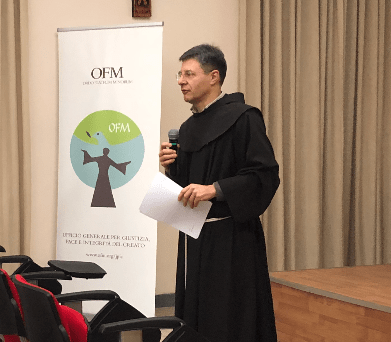The Pontifical Antonianum University has recently put the fruits of four interdisciplinary seminars on integral ecology, held in the last two years to productive use. With three introductory courses on urban ecology, concerning metabolism, flows and scales, they introduced the students of the professional programme in integral ecology, during the second week of the diploma, to an integrated ecology project, to be discussed and verified with experts of different disciplines, from environmental engineering, to communication ethics, from economics to managerial engineering, from anthropology to ethics.
We believe the search for an interdisciplinary approach, involving experts not only of the theological-religious and ethical-philosophical sciences but also of the empirical sciences, coming from non-pontifical university centres, is the indispensable prerequisite for adequately reflecting on the environmental crisis. Moreover, the interdisciplinary venture also relies on the project of an international network for integral ecology, which the Antonianum has been working on for some years. The care of the common home can only hope to present itself, not solely as doing and reporting, but also as thinking and conceiving new vision by taking root in a cultural substratum, enriched by interdisciplinary comparison.

The gateway to interdisciplinary work is undoubtedly the incompleteness of one’s own scientific work, which every scholar must be willing to admit when confronted with colleagues from other disciplines. Pope Francis refers to the notion of incompleteness in the conclusion of the first chapter of Laudato si’, which presents an overview of scientific data concerning the environmental crisis: “On many concrete questions, the Church has no reason to offer a definitive opinion; she knows that honest debate must be encouraged among experts, while respecting divergent views”. The principle of incompleteness already laid out in Gaudium et Spes constitutes for Francis the criterion of judgment of the same scientific quality of theological research: “The theologian who is satisfied with his complete and conclusive thought is mediocre.”Therefore, the theologian who intends to dialogue with the empirical sciences, up to siding in favour of scholars who highlight data on the environmental crisis as, for example, in Laudato si’, must assume incompleteness as a code of their speaking and their debating.
[…]
The integral approach to reality, in the awareness that “everything is connected,” invites usto overcome mere interdisciplinarity or trans-disciplinarity and to look towards a meta-disciplinarity, which takes responsibility of the same “inequality” of which cultural politics is also a victim. Considerations on local, marginal and minority phenomena, indispensable for the understanding of the whole, are often excluded from international debate and from the academic community itself because of their political weight. This summary of criteria suggested by Laudato si’ for integral interdisciplinarity, cannot be considered exhaustive, if the anthropological criterion is sidestepped, as it provides for the vertical dimension, in addition to the horizontal, social dimension. Integral anthropology includesthe existential or spiritual dimension, touching the dimension of emotions, of the body, of everyday life, made up of small choices, work, family, friends: “Environmental education should facilitate making the leap towards the transcendent which gives ecological ethics its deepest meaning.” (Laudato si’, 210).
Fr. Giuseppe Buffon, OFM
Dean of Faculty of Teology – PUA
Read the full text in Italian: L’Osservatore Romano

